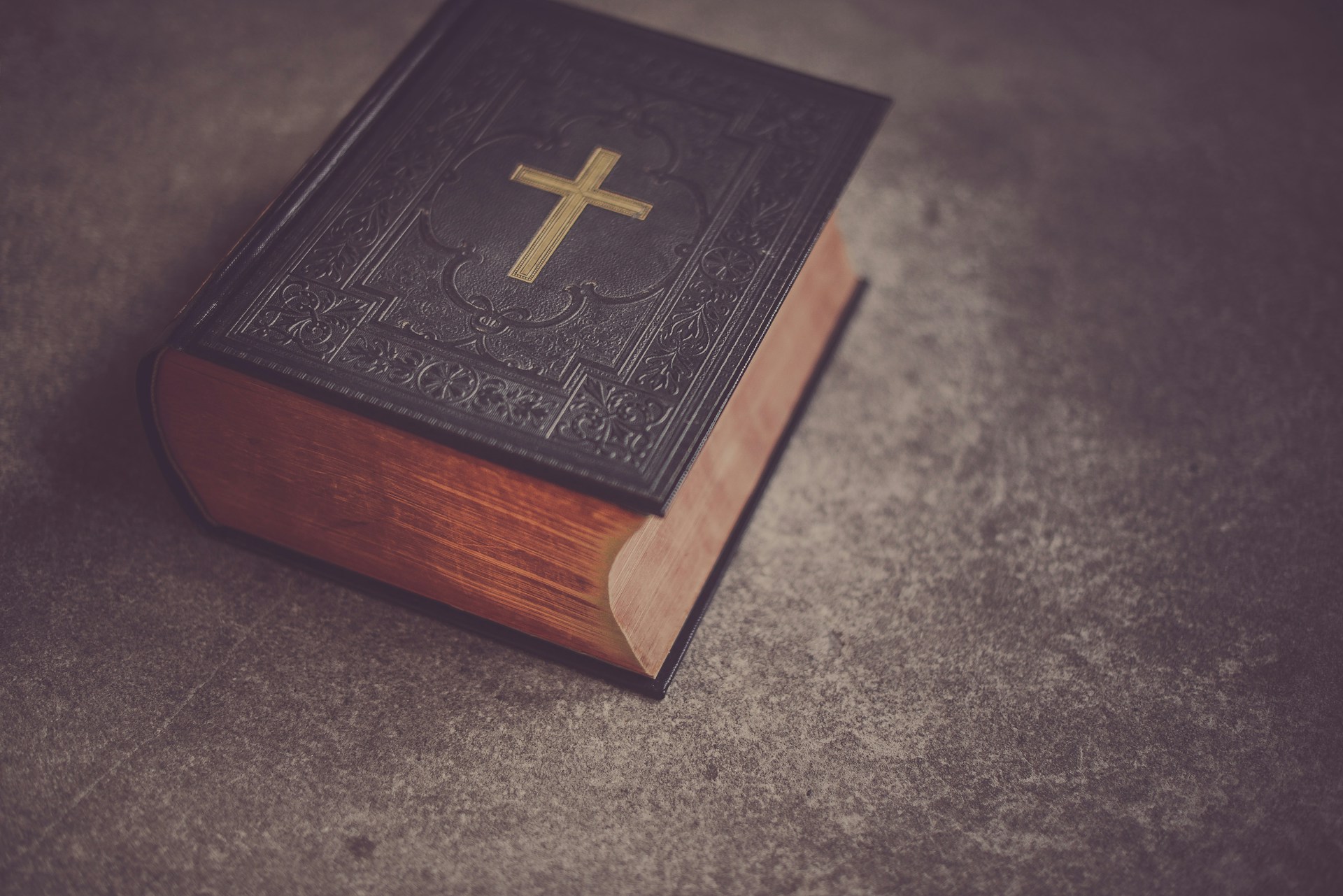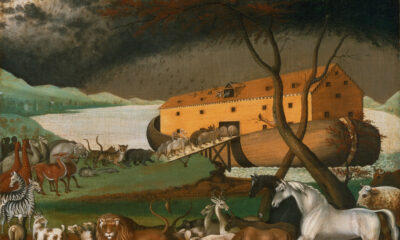Faith
Protesters Rally to Defend Easter Traditions at School

In a powerful display of faith and conviction, Christians gathered outside Norwood Primary School in Eastleigh, Hampshire, to protest the school’s controversial decision to cancel its traditional Easter parade and church service. The cancellation, announced by Headteacher Stephanie Mander, was met with disappointment and frustration from the Christian community, who viewed it as an affront to their cherished traditions and values.
Approximately 50 demonstrators, many from the Living Word Church in Fareham, stood firm in their beliefs, waving England flags adorned with messages such as “Jesus: the way, the truth, the life” and “Jesus is king.” Their presence was a testament to the enduring importance of Christianity in British culture and the need to uphold these values in educational settings.
Rev. Chris Wickland, a participant in the protest, emphasized that their demonstration was not about causing trouble but about standing against the exclusion of Christianity from schools. His words resonated with many who feel that Christian traditions are increasingly marginalized in the name of inclusivity.
Ukip leader Nick Tenconi also lent his voice to the protest, reading Mander’s letter aloud and criticizing the school’s decision as an attempt to sideline Christianity to meet diversity criteria. He accused the school of prioritizing funding over faith, a sentiment echoed by many in attendance.
Marie Pigney, a grandmother from Titchfield, passionately argued that Christianity provides a beneficial foundation for children and society. Her words highlighted a growing frustration among Christians who feel marginalized and unfairly labeled.
Rob Owen, another protester, stressed the importance of preserving Easter traditions as part of the larger cultural identity. The demonstrators’ actions, including handing out Easter eggs and displaying a “Happy Easter” banner, underscored their commitment to maintaining these traditions for future generations.
While a small group of parents staged a counter-protest, claiming that the demonstration promoted unnecessary hatred, the Christian protesters remained focused on their message of faith and unity. One anonymous parent defended Mander, citing financial constraints and the desire to accommodate diverse views as reasons for the changes. However, this explanation did little to quell the concerns of those who see the decision as a step away from traditional values.
The protest concluded with a collective prayer, a powerful reminder of the strength and resilience of the Christian community. As the school day ended, the demonstrators dispersed peacefully, their message clear: faith, family, and freedom are worth standing up for, even in the face of adversity.
In a world where traditional values are often challenged, the actions of these protesters serve as a beacon of hope and a call to action for all who cherish their faith and heritage.
Let us know what you think, please share your thoughts in the comments below.
Faith
Singer’s Unexpected Path to Inner Peace

In a world where the noise of modern life often drowns out the whispers of the soul, Christian singer Brandon Lake has found inspiration in an unexpected place. His collaboration with Jelly Roll on the new album “King of Hearts” has not only enriched his musical journey but also prompted him to set meaningful boundaries in his personal life. This decision reflects a commitment to the core values of faith, family, and freedom that resonate deeply with those who cherish traditional Christian principles.
Brandon Lake shared a pivotal moment when Jelly Roll recounted a bold act of liberation—throwing his phone into a river after feeling overwhelmed by the constant barrage of calls and texts.
“He had told me how he threw his phone in the river after his Bridgestone show in Nashville. I was like, ‘Tell me more about that,'” Lake explained. “He’s like, ‘I’m calling you from a flip phone right now.'”
Inspired by this act, Lake decided it was time to refocus on the people who truly matter in his life.
“And while I would love to be friends with everyone… the bigger things have gotten, the smaller I’ve had to go,” he explained. “And really make sure I have the right people around.”
Lake’s journey is a testament to the importance of prioritizing one’s spiritual and emotional well-being. His new album, “King of Hearts,” is not just a collection of songs but a reflection of his mission to minister to people and shepherd them with love and grace.
“I’ve been looking forward to this day for a long time,” he said of the album release. “More than focusing on the products and the things that I’m making, that I exist to minister to people, to minister God.”
In a world that often glorifies the superficial, Lake’s commitment to singing about faith and family stands as a beacon of hope. He is clear about what he will not sing about, emphasizing the transformative power of faith-based music.
“I wouldn’t sing about drugs or, you know… I do know what I want to sing about and that’s my faith, that’s what my family does.”
The collaboration with Jelly Roll on the song “Hard Fought Hallelujah” came about serendipitously, with Jelly Roll discovering the song on TikTok and falling in love with its message. This partnership has blossomed into a profound friendship, grounded in shared values of family and faith.
Lake’s personal journey has not been without challenges. He candidly shared his struggles with mental health, a reminder that even those who walk closely with God can face trials. Yet, through these experiences, he has learned the importance of leaning on community and seeking God’s guidance first and foremost.
“Brandon, you need to relearn how to go to God first and most.”
Living on a farm has provided Lake with a sanctuary away from the pressures of touring, allowing him to reconnect with the simplicity of God’s creation.
“Even moving out to the country has been very healing, and I needed to do something opposite of tour and the big platform.”
In these moments of quiet reflection, Lake finds solace and strength, embodying the timeless wisdom that true peace comes from aligning one’s life with God’s purpose. As he continues to inspire others with his music and testimony, Brandon Lake remains a steadfast advocate for the values that define a life of faith, family, and freedom.
Let us know what you think, please share your thoughts in the comments below.
Faith
Medieval Bible Returns to Its Historic Homeland

In a remarkable testament to the enduring power of faith and tradition, a medieval Bible has made its way back to the land of its origin, now displayed in the National Library of Israel. This rare 14th-century Shem Tov Bible, a masterpiece of biblical and artistic scholarship, was recently acquired for a seven-figure sum and is now available for public viewing. Its journey back to Israel after centuries is a poignant reminder of the deep historical roots that underpin our shared Judeo-Christian values.
The Shem Tov Bible, crafted by the Kabbalist rabbi Shem Tov ben Abraham Ibn Gaon in 1312, is not just a religious artifact but a symbol of the enduring legacy of faith. After its creation in medieval Spain, the Bible embarked on a journey that took it to modern-day Israel, North Africa, and eventually back to Jerusalem. This journey is emblematic of the resilience and steadfastness of religious traditions that have weathered the storms of time.
Sallai Meridor, chairman of the National Library of Israel, eloquently captured the Bible’s significance, stating, “Having traveled from Spain to Jerusalem, Baghdad, Tripoli, London and Geneva, the Shem Tov Bible has come full circle and is now back home.” This return to Jerusalem is a powerful symbol of faith coming home to its roots, reinforcing the importance of preserving our spiritual heritage.
The intricate artwork of the Shem Tov Bible reflects a harmonious blend of Islamic and Christian influences, adapted to the Jewish tradition of beautifying sacred objects. This artistic synthesis serves as a reminder of the shared cultural heritage that has historically enriched our spiritual practices. The Bible’s design, featuring gothic arches, gilded frames, and illuminated markers, is a testament to the dedication to glorifying the Word of God through beauty and craftsmanship.
The Herenstein family, current owners of the Bible, expressed their joy in seeing this monumental work become part of the library’s permanent collection. They noted that the manuscript “characterized the best of medieval Jewish bookmaking,” highlighting the enduring legacy of skilled artisans dedicated to preserving sacred texts.
Furthermore, the digitization of the Shem Tov Bible ensures that its beauty and scholarly value are accessible to people worldwide. This commitment to sharing knowledge aligns with the belief in spreading truth and wisdom, reinforcing the importance of faith-based education.
National Library of Israel curator Chaim Neria emphasized the Bible’s role in preserving Jewish traditions that have nearly vanished from history. By studying this ancient text, scholars can reconnect with the past and gain insights into the spiritual practices that shaped our religious heritage.
In a world where traditional values are often challenged, the return of the Shem Tov Bible to Israel is a powerful affirmation of the enduring strength of faith, family, and freedom. It serves as a reminder that our spiritual heritage is a cornerstone of our identity, guiding us in our pursuit of a society grounded in biblical principles and moral clarity.
Let us know what you think, please share your thoughts in the comments below.
Faith
Cuba’s Crackdown on Faith Sparks Global Concern

In a world where faith, family, and freedom are the cornerstones of a thriving society, it is disheartening to witness the escalating repression of religious freedoms and civil liberties in Cuba. A recent report by Christian Solidarity Worldwide, a UK-based watchdog, sheds light on the Cuban government’s intensified crackdown on religious expression and humanitarian efforts, targeting individuals who dare to uphold their beliefs and offer aid to those in need.
The report documents a staggering 624 incidents where freedom of religion or belief was violated, amounting to 1,898 individual violations. This alarming trend reveals a systematic effort to suppress religious leaders across Cuba, regardless of whether they belong to registered or unregistered groups. These leaders face harassment, surveillance, and punishment for their commitment to their faith and community.
Intrusive interrogations, threats, and financial penalties have become commonplace for those holding services in unapproved locations or leading unregistered gatherings. The Communist regime’s pressure extends to ostracizing families of political prisoners, with church leaders being coerced to expel these families from their congregations. Such actions are a stark reminder of the regime’s disregard for the sanctity of family and community.
Religious groups of all types, including Afro-Cuban communities, Jehovah’s Witnesses, Protestants, and Roman Catholics, have not been spared from this repression. Even those within the government-recognized Cuban Council of Churches report violations. The targeting of Afro-Cuban religious communities is particularly severe, with violent interruptions of private gatherings and accusations of inciting counter-revolutionary activity.
One notable incident involved police raiding a private celebration led by Babalawo Reinerio Fuentes in Ciego de Ávila. Authorities forced the group to disperse, citing complaints from a neighbor, highlighting the regime’s intolerance for spiritual gatherings. Such actions underscore the regime’s fear of the power of faith and community solidarity.
The Cuban government appears particularly intent on targeting those offering material or spiritual aid to families of political prisoners. These detainees face systematic violations of The Nelson Mandela Rules, which set basic rights for humane conditions and dignity. Security forces use pre-emptive detentions and threats to prevent gatherings, with fines totaling over 1.1 million Cuban pesos imposed on religious leaders conducting unauthorized worship or aid distribution.
In a troubling development, children in schools face physical and verbal abuse due to their religious beliefs. Authorities block suspected dissidents from attending religious services, detaining them arbitrarily. Religious leaders attempting to distribute humanitarian aid in worsening economic conditions are harassed, fined, and have their aid confiscated.
Furthermore, the regime increasingly targets churches for using Cuban flags or national symbols during worship. Pastors face interrogation, fines, and accusations of “counter-revolutionary” activities for encouraging congregants to pray for the nation while displaying the flag. This is a direct assault on the patriotic spirit and the right to express faith freely.
Under the Social Communication Law, passed in 2023, the government regulates online activity to suppress dissent. Pastors and leaders using social media to discuss humanitarian needs or prayer services face accusations of defamation or promoting ideological division. One pastor was told that posting about poverty “discredits the Revolution,” highlighting the regime’s fear of truth and transparency.
Despite these risks, many religious leaders continue to speak out against human rights abuses, challenging the government’s rejection of political or social reform. Pastor Alain Toledano Valiente, an exiled leader of the unregistered Apostolic Movement, exemplifies this courage. Prohibited from returning to Cuba to be with his daughter undergoing surgery, Toledano Valiente remains a beacon of hope and resilience.
In a world where the values of faith, family, and freedom are under siege, it is imperative for those who cherish these principles to stand in solidarity with the oppressed. The Cuban regime’s actions serve as a stark reminder of the importance of defending religious freedom and upholding the dignity of every individual. As we reflect on these challenges, let us reaffirm our commitment to a society where faith and freedom flourish, guided by biblical principles and a steadfast belief in the power of truth and love.
Let us know what you think, please share your thoughts in the comments below.
-

 Self-Reliance3 months ago
Self-Reliance3 months agoTrump’s Bold Move Uncovers Massive Social Security Fraud
-

 News4 months ago
News4 months agoGovernor Walz’s Rhetoric Sparks National Controversy
-

 Faith3 months ago
Faith3 months agoNew Clues Emerge in Noah’s Ark Mystery
-

 Family3 months ago
Family3 months agoTexas Lawmaker Targets Furries in Schools
-

 News3 months ago
News3 months agoMel Gibson’s ‘The Passion of the Christ’ Sequel Title Announced
-

 Freedom3 months ago
Freedom3 months agoMaine Lawmaker Challenges Sports Fairness Controversy
-

 Family1 month ago
Family1 month agoCanada’s Controversial Policy Sparks Ethical Debate
-

 Faith2 months ago
Faith2 months agoMassive California Baptism Bash Shatters Records, Ignites Thousands!




